No Coward Souls ~ Tragedy, Obsessive Love, and Addiction Plagued the Brontës
Three themes plagued the Brontës in life and influenced their writing

What experiences shaped the lives of the Brontës that led them to produce such literary masterpieces as Jane Eyre, Wuthering Heights, and The Tenant of Wildfell Hall?
Tragedy
On January 17, 1820, Maria Branwell and the Rev. Patrick Brontë welcomed a sixth child into their growing, boisterous household–a little girl named Anne. One year later, tragedy struck and destroyed the family's happiness when Maria fell terminally ill with cancer. The Brontë's beloved mother endured cancer's wrath for close to eight months before death relieved her on September 15, 1821. Her final parting words reportedly were, “Oh God, my poor children."
Less than four years after Maria's death, tragedy hit the Brontës a second and third time when the two eldest children, Maria (11) and Elizabeth (10), died after contracting tuberculosis at the Cowen Bridge Clergy Daughters' School.
These losses—particularly that of Maria—who had become a surrogate mother to her younger siblings, tormented the Brontë children for life.

Maria Memorialized in Literature
Charlotte, who attended Cowen Bridge with her sisters, famously memorialized Maria as Helen Burns in Jane Eyre. In the novel, Cowen Bridge becomes Lowood. Charlotte's descriptions of the school and its supervisor, Mr. Brocklehurst (real-life Rev. William Carus Wilson), were so damning that she infuriated the school's founders, who responded with, A Vindication of the Clergy Daughters' School, which included letters of support from former pupils.
Maria's death also tormented Branwell. According to biographer Winifred Gerin, Branwell alleged that Maria often knocked on his window at night and cried to be let inside. Emily echoed this tale in Wuthering Heights when Lockwood hears a scratching noise at his window and sees "a child’s face looking in." The child cries, 'Let me in - Let me in! - I’m come home: I’d lost my way on the moor!’ (Brontë, Emily. Wuthering Heights)
As an adult, Branwell gave voice to his pain in his poems "Mercy II" and "Caroline."

Obsessive Love ~ Charlotte's Married Man
From 1842-1844, Charlotte lived in Brussels and attended school at the Pensionnat Heger. While there, she fell in love with her married professor (also the headmistress's husband), Constantine Heger. After returning to England, Charlotte penned Heger a series of love letters (now stored in the British Library) that record her obsession.
In one letter, she tells Heger, " I find it difficult to be cheerful so long as I think I shall never see you more." She goes on to declare, "I have never heard French spoken but once since I left Brussels - and then it sounded like music in my ears - every word was most precious to me because it reminded me of you - I love French for your sake with all my heart and soul."
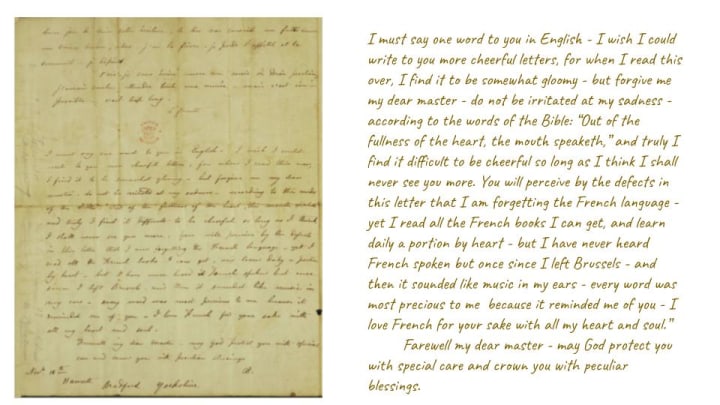
When the father of six failed to reply to Charlotte's letters, she begged him to relieve her suffering:
"... day after day I await a letter and day after day disappointment flings me down again into overwhelming misery, when the sweet delight of seeing your writing and reading your counsel flees from me like an empty vision – then I am in a fever – I lose my appetite and my sleep – I pine away."
Charlotte's obsession with Heger is vividly present in her novels The Professor, Villette, and Jane Eyre. The first two involve relationships between master and pupil, and the latter recounts a romance between a married man and his ward's governess.
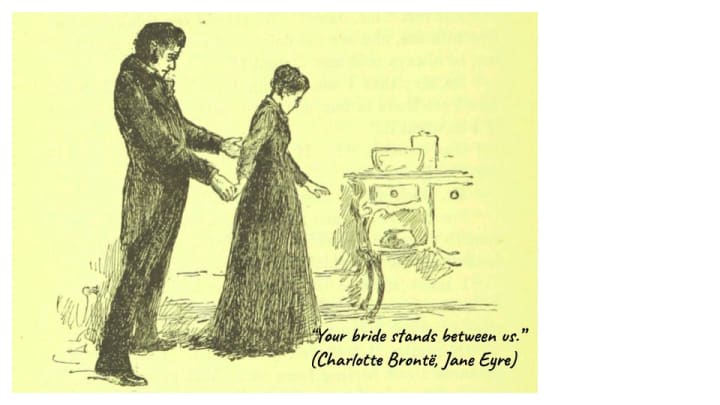
The Original Mrs. Robinson
In 1843, while Charlotte was in Brussels, Anne and Branwell were in York working as tutors for the Robinson family. While there, Branwell had an affair with Mrs. Lydia Robinson, his employer's wife, for over two years. In 1845, Mr. Robinson discovered the affair and fired Branwell. Anne was so ashamed of her brother's behavior that she resigned from her governess position.
A year later, Mr. Robinson died, and Branwell believed that the love-of-his-life would marry him. Instead, she sent word that a stipulation in her husband's will forbade her to marry Branwell, or she would lose her inheritance. She chose the money, and Branwell spiraled into a dark, alcoholic depression.
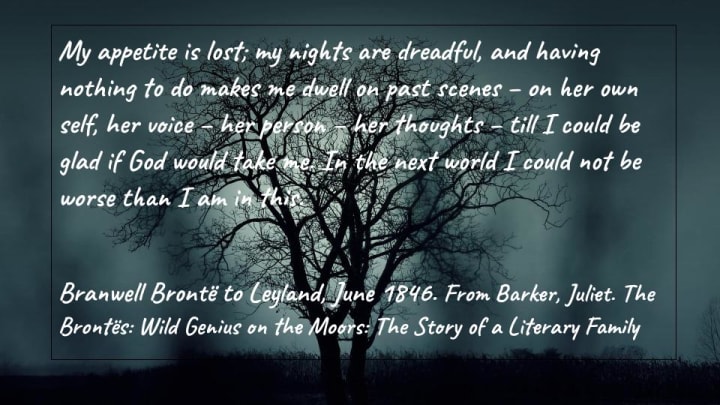
Two years later, Branwell was dead.
A similar scenario is seen in Heathcliff's obsession for Cathy and his downward spiral after her death.

Addiction
In The Life of Charlotte Brontë, Elizabeth Gaskell writes that Branwell started taking "opium habitually" and drank excessively toward the end of his life. He terrified his family with his unruly behavior and delirium tremens. As their brother destroyed himself, Charlotte, Emily, and Anne looked toward the future and wrote their famous novels.
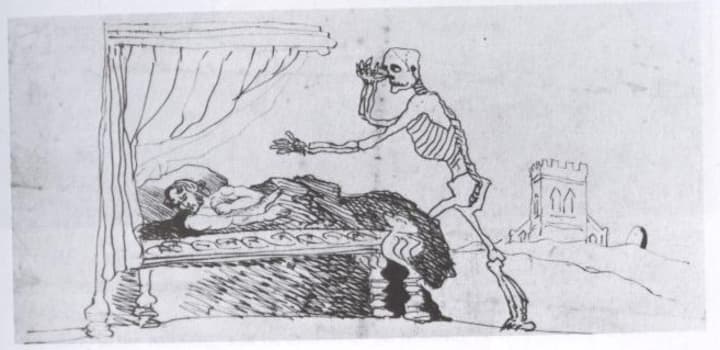
Addiction in the Brontë Novels
Both Emily and Anne give harrowing accounts of life with a chronic alcoholic in their novels. In Wuthering Heights, Hindley Earnshaw drinks himself to death as does Arthur Huntingdon in The Tenant of Wildfell Hall. Even Charlotte's madwoman may have been influenced by Branwell. Remember the scene in Jane Eyre when Bertha sets Rochester's bed alight? Reportedly, Emily rescued Branwell from his burning bed after he set it on fire while drunk.
While many others, like Lord Byron, influenced their writing, all three Brontë sisters were excellent at portraying the darker side of human nature, but this darkness is laced with pity and grief, which no doubt stems from the deep love they felt for their troubled brother.
After Branwell died, a grief-stricken Charlotte wrote Ellen Nussey saying, he is in God's hands now - and the all-powerful - is likewise the all merciful-a deep conviction that he rests at last-rests well after his brief, erring, suffering, feverish life fills and quiets my mind now.
When the brutal Arthur Huntingdon dies, Helen Huntingdon makes a similar remark:
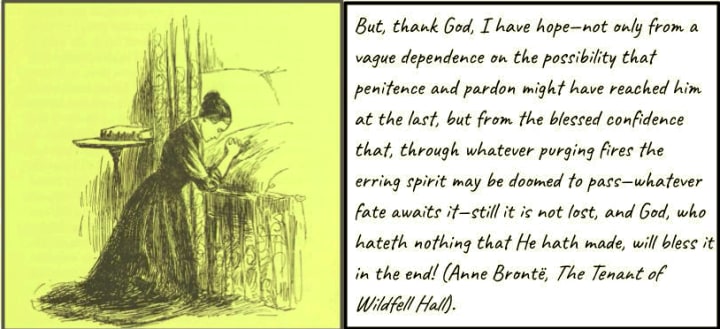
The Brontë sisters wrote with honesty, conveying raw emotions attached to love, loss, and mental health. They refused to conform to the Victorian expectation of ideal womanhood, but they also understood that the world wasn't ready for their strong female voices. Therefore, they elected to write under the pseudonyms Currer, Ellis, and Acton Bell. A wise decision, considering the "shocked," "disgusted," and "sickened," reactions Emily and, later, Anne elicited from early critics.
Luckily, the Brontës didn't write to please critics or win fans. They wrote because, as Charlotte put it, they could "not help it." They had something to say about love, humanity, and life, and they would not be stopped by those who told them that "[l]iterature cannot be the business of a woman's life" or censored by those who disapproved of their work. Thankfully, they were no coward souls.
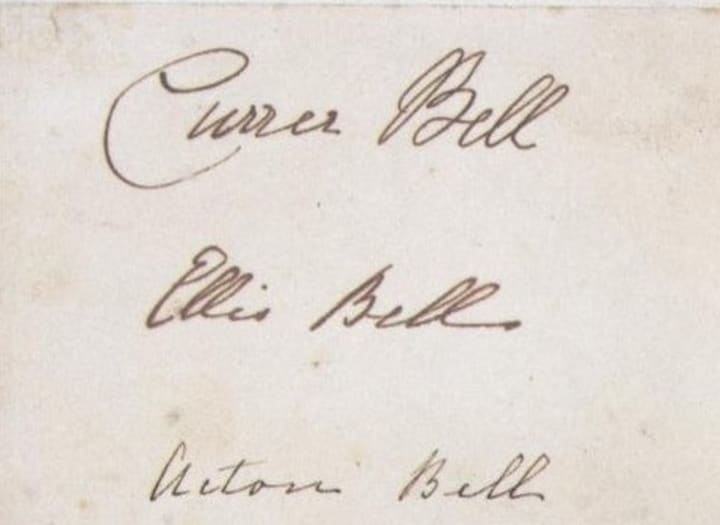
About the Creator
A. Orr
Writer, teacher, lover of literature.
Facebook: https://www.facebook.com/Aviva-Orr-Author
https://twitter.com/aviva_orr
avivaorrauthor.com
Enjoyed the story? Support the Creator.
Subscribe for free to receive all their stories in your feed. You could also pledge your support or give them a one-off tip, letting them know you appreciate their work.






Comments
There are no comments for this story
Be the first to respond and start the conversation.